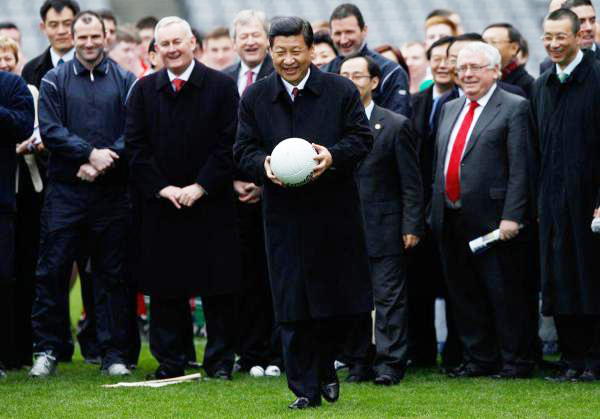China kicks off plan to turn soccer around
Updated: 2015-03-16 14:26
By ZHANG YUNBI(chinadaily.com.cn)
|
|||||||||||
Related readings:
An avid soccer fan, President Xi has made a number of public comments related to Chinese soccer to express his support and has high hopes for the national team.
He has made no secret of his determination to improve the sport's image, which has been tarnished by scandals and poor administration.
March 2, 2015
President Xi Jinping and Prince William, both avid soccer fans, discussed sports exchanges between China and Britain, highlighting the cooperation in soccer during their meeting in Beijing as the Duke of Cambridge paid his first official visit to China.
Xi said China had cooperated with Britain in football in different ways, including a cooperation deal signed in 2013 between the Chinese Super League and EPL, and would like to learn the game from world top teams including England.
Prince William asked about Xi's interest in football and said he hoped to see more Chinese play in the English Premier League (EPL).
Xi added that he expected William to continue to promote sports exchange and cooperation between the two countries.
Chinese first landed on EPL in 2002 when Sun Jihai joined Manchester City and Li Tie, now a Chinese national team coach, made it to Everton. They were followed by Dong Fangzhuo and Zheng Zhi, current China captain.
Feb 27, 2015
A meeting of China's Leading Group for Overall Reform, headed by President Xi Jinping, approved a reform plan to boost every area of the sport from playgrounds to stadiums and said institutional flaws hindering the game's development must be tackled.
Entitled "The overall plan for the reform of Chinese soccer," the project calls for increased public involvement and diversified training, including campus soccer and professional clubs, to develop young players and hone their skills.
It also highlights the need for an innovative approach, combining the state-run system with market forces.
Today's Top News
Putin to meet Kyrgyz president in St. Petersburg
Film on Crimea sparks off quarrels
Germany seeks co-op with China in high-tech area
Air China to start Budapest-Beijing flight, Hungarian minister says
UK seeks to join China-proposed bank
China has 'huge growth potential'
72% worry about retirement life
Fears voiced over violent scenes
Hot Topics
Lunar probe , China growth forecasts, Emission rules get tougher, China seen through 'colored lens', International board,
Editor's Picks

|

|

|

|

|

|






